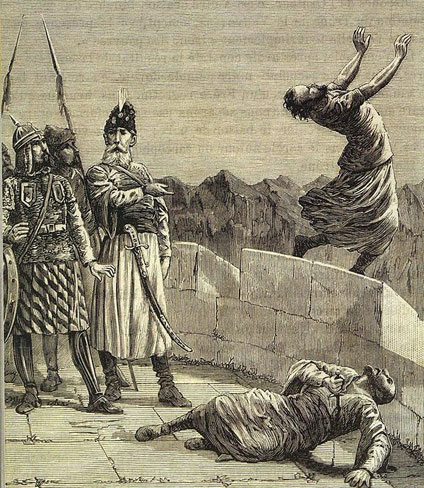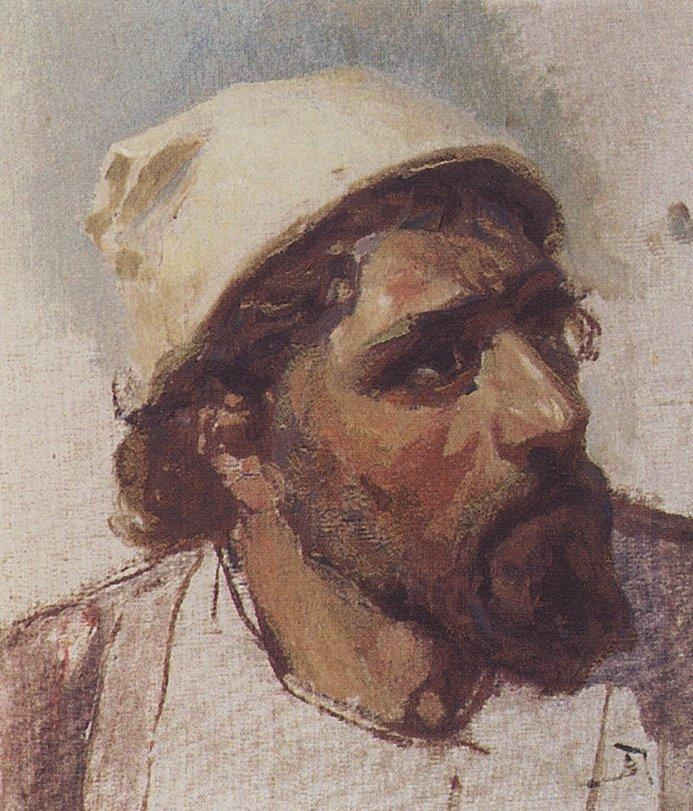|
You will sometimes hear it stated that no one in the ancient world
found any moral problem with slavery. This is very far from
being the truth. Not only the Christian Circumcelliones, but pagans
writers, did perceive moral dilemmas associated with slavery. Alcidamas of
Elaea, of the school of Gorgias, left behind a bon mot which unfortunately
survives only in fragmentary state: "God has left all men free; nature has
made no one a slave."
The Stoic Epictetus, himself a slave, spoke movingly about his
condition:
"But when you have asked for warm water and the slave has not heard, or if he did hear has brought only tepid water, or he is not even found to be in the house, then not to be vexed or to burst with passion, is not this acceptable to the gods? How then shall a man endure such persons as this slave? Slave yourself, will you not bear with your own brother, who has Zeus for his progenitor, and is like a son from the same seeds and of the same descent from above? But if you have been put in any such higher place, will you immediately make yourself a tyrant? Will you not remember who you are, and whom you rule? that they are kinsmen, that they are brethren by nature, that they are the offspring of Zeus? But I have purchased them, and they have not purchased me. Do you see in what direction you are looking, that it is toward the earth, toward the pit, that it is toward these wretched laws of dead men? but toward the laws of the gods you are not looking."
(Epictetus, Discourses, Book I, Chapter 13).
The Stoics were not abolitionists; they were not looking for
political reform of the slavery system, rather, they sought to solve
the problem, of how can our minds remain free while our bodies are
under the control of others. A recondite moral problem perhaps, but
not one which proceeds from the premise that slavery is entirely
unproblematical morally. Epictetus himself had been a slave. He is not
the Frederick Douglass of his people, but neither is he any great
booster of the slavery system. In a sort of delayed reaction, his teaching
would later prove an inspiration for the Haitian liberator, Toussaint
L'Overture.
Dio Chrysostom does not regard the slavery system as morally
justifiable, realizing that it all hangs on the question of whether the
conqueror can legitimately enslave the populace of the defeated town:
"For manifestly of those who from time to time acquire slaves, as they acquire all other pieces of property, some get them from others either as a free gift from someone or by inheritance or by purchase, whereas some few from the very beginning have possession of those who were born under their roof, 'home-bred' slaves as they call them. A third method of acquiring possession is when a man takes a prisoner in war or even in brigandage and in this way holds the man after enslaving him, the oldest method of all, I presume. For it is not likely that the first men to become slaves were born of slaves in the first place, but that they were overpowered in brigandage or war and thus compelled to be slaves to their captors. So we see that this earliest method, upon which all the others depend, is exceedingly vulnerable and has no validity at all; for just as soon as those men are able to make their escape, there is nothing to prevent them from being free as having been in servitude unjustly. Consequently, they were not slaves before that, either. And sometimes they not only escaped from slavery themselves, but also reduced their masters to slavery. In this case, also, we have now found that 'at the flip of a shell,' as the saying goes, their positions are completely reversed."
(Dio Chrysostom, Fifteenth Discourse).
To be sure, Dio was no abolitionist. Indeed, he has the chutzpah to
complain when his own slaves ran away owing to the ups and downs of his
affairs: ". . .so many slaves had run away and obtained freedom, so many persons had defrauded me of money, so many were occupying lands of mine, since there was no one to prevent such doings."
(Dio Chrysostom, Discourse 45, 10). But to claim, as they do, that he
and his contemporaries perceived no moral problem at all in slavery is
simply fanciful. They understood that the institution which was the
cornerstone of their economy was, morally, deeply problematical.
At the close of every year, the Roman
people celebrated the Saturnalia, in honor of King Saturn, a legendary
ruler in Italy with some imagined connection to the planet of the same
name. The observance, which unfortunately generally degenerated into a
drunken riot, looked back to the Golden Age believed to have existed,
before there was war, before there was slavery, when people lived on
acorns. "They established a holiday on which masters and slaves should eat together,— not as the only day for this custom, but as obligatory on that day in any case."
(Lucius Annaeus Seneca, Letter 47). Masters waited upon
their slaves. This, again, was not a practical program for abolition,
but neither was it an unvarnished endorsement of the existing system.
Everyone knew, and was reminded by the recurring Saturnalia, that life
could be different.
When slave liberations did occur, as under Moses or Solon the
Athenian, the liberators did not liberate all slaves for all time nor
intend to do so. Slaves were freed, but there was no 13th amendment
to follow in a mopping up operation. Solon intended to free those Athenian
citizens who had fallen into slavery owing to debt, not foreigners. This he
did:
"But most agree that it was the taking off the debts
that was called Seisacthea, which is confirmed by some places in his
poem, where he takes honor to himself, that
"'The mortgage-stones that covered her, by me
Removed,— the land that was slave is free;'
"that some who had been seized for their debts he had brought back from
other countries, where
"'— so far their lot to roam,
They had forgot the language of their
home;'
"and some he had set at liberty,—
"'Who here in shameful servitude were held.'"
(Plutarch's Lives of the Noble Grecians and Romans, Life of Solon).
Cyrus the Persian was another partial liberator. A cylinder is still
extant in which, in the second part, Cyrus speaks in the first person. He begins with his titles and continues saying that he took care of Marduk's cult at Babylon, and that he had “allowed them to find rest from their exhaustion, their servitude.”
(The Cyrus Cylinder, World History Encyclopedia). These individuals
may have personally been in a state of servitude, or the community as a
whole may have been placed in a disadvantageous state, which he rectified,
and fully expected to feel their gratitude. This partial character of
ancient emancipations reflects, I think the birth of slavery in war. Or so
Heraclitus thought:
“Polemos (War) is the father of all beings, and the king of all beings: some of them he turns into
gods, and others into humans, some he makes slaves, and others makes free.”
(Fr. 32L / B 53, Heraclitus).
It does seem that Heraclitus is on to something in thinking that war is
the progenitor of slavery as an institution. And in war, there are winners
and losers; it is the ultimate zero sum game. When Adolf Hitler invaded
Yugoslavia, he did not cosy up to the Serbs, who were already the dominant
group. Rather, he portrayed himself as the liberator of the Croats, who
had been second-class citizens in their own native land. Certainly war can
lead to a reversal of fortune, where oppressed and oppressor change
places. The rematch, if held, would then be a
war of liberation for the slaves, though not necessarily animated by any
principled opposition to slavery.
|

